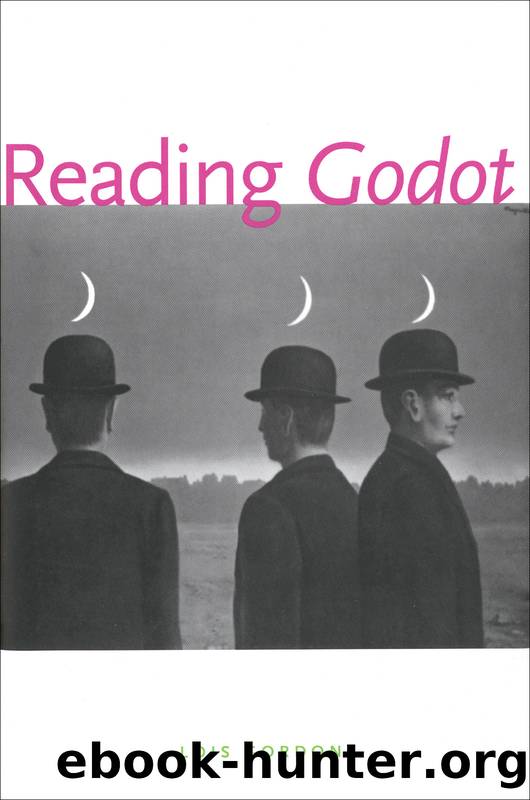Reading Godot by Lois G. Gordon

Author:Lois G. Gordon
Language: eng
Format: epub
Publisher: Yale University Press
Published: 2002-08-14T16:00:00+00:00
SIX
“The key word ... is ‘perhaps’”
INTERVIEWER : How can you be so preoccupied with salvation when you don’t believe in it?
BECKETT : I am interested in the shape of ideas, even if I do not believe in them. There is a wonderful sentence in Augustine. I wish I could remember the Latin. It is even finer in Latin than in English: “Do not despair; one of the thieves was saved. Do not presume; one of the thieves was damned.” That sentence has a wonderful shape. It is the shape that matters.
Beckett’s unique stage rhetoric, in keeping with the complex networking of total mental functioning, animates the play’s every detail, propelling it into multiple transformations. Pozzo’s chicken bones, for example, become the skulls, skeletons, corpses, and charnel houses that punctuate the play, haunting reminders of human destiny. The rock, tree, rope, hats, trousers, pipe, vaporizer, bones, coat, glasses, leaves, stool, and whip merge into a conglomerative object or conglomerative emblem, if you will, of achievement and surrender, hope and suffering —of the continuously assertive but futile act of waiting for personal verification and salvation, for a raison d’être.
If Beckett’s treatment of objects is in keeping with unconscious, primary process thought, as he serializes objects as dream images of unconscious needs, his handling of them also underscores the existential dimension of the play. Beckett’s objects are often familiar symbols of human endeavor and failure, like the eyeglasses, watch, pipe, and food basket that become useless to a blindman who finally understands his lack of control over time and space, as well as the arrogance of his earlier indulgences as a member of the privileged class.
In discussing Beckett’s treatment of objects, as they reflect both conscious and unconscious levels of thought, another frame of reference may be helpful, for Beckett’s presentation of them bears comparison with the work of Cézanne and Monet, the progenitors of the Cubists and Abstract Expressionists—all of whom explored the exigencies of the existential moment.
Beckett is known to have been deeply influenced by many painters, so much so that he reproduced their subjects and formal shapes in his stage designs. Waiting for Godot, for example, bears an uncanny resemblance to Jack Yeats’s Two Travellers and Tinkers’ Encampment: The Blood of Abel. The image of two lonely men on the verge of companionship or enmity, like Cain and Abel, was repeated in many of Yeats’s paintings.1 Beckett was drawn to Yeats’s hoboes and clowns, to his recurrent images of a destitute and bereft humanity, as well as to his efforts to evoke the deepest recesses of thought. “Tapping the great internal reality,” as Beckett put it, was at the core of Yeats’s “incomparable” art, in “its insistence upon sending us back to the darkest part of the self... and upon permitting illuminations only through that darkness.”2
As noted earlier, the Surrealists’ fascination with the dreamworld had a powerful impact on Beckett. He shared their interest in the power of unconscious thinking, although he disapproved of many of their conclusions and artistic goals.
Download
This site does not store any files on its server. We only index and link to content provided by other sites. Please contact the content providers to delete copyright contents if any and email us, we'll remove relevant links or contents immediately.
Cecilia; Or, Memoirs of an Heiress — Volume 2 by Fanny Burney(31956)
Cecilia; Or, Memoirs of an Heiress — Volume 3 by Fanny Burney(31942)
Dialogue by Robert McKee(4405)
The 101 Dalmatians by Dodie Smith(3511)
Bound by Hatred (The Singham Bloodlines Book 2) by MV Kasi(3086)
The Art of Dramatic Writing: Its Basis in the Creative Interpretation of Human Motives by Egri Lajos(3068)
Harry Potter and the Cursed Child - Parts One and Two by John Tiffany(3044)
The Beautiful Boys: A High School NA Reverse Harem Paranormal Bully Romance (Shadowlight Academy Book 1) by Gow Kailin(2868)
Angels in America by Tony Kushner(2662)
Carrie's War by Nina Bawden(2469)
A Clockwork Orange by Anthony Burgess(2468)
Unlaced by Jaci Burton & Jasmine Haynes & Joey W. Hill & Denise Rossetti(2375)
The Femme Playlist & I Cannot Lie to the Stars That Made Me by Catherine Hernandez(2293)
Open Book by Jessica Simpson(2267)
Drama by John Lithgow(2235)
Outside Woman (BWWM Amish Romance) by Stacy-Deanne(2121)
Terrorist Cop by Mordecai Dzikansky & ROBERT SLATER(2080)
Yerma by Federico García Lorca(2071)
Leo's Desire by Sundari Venkatraman(1932)
